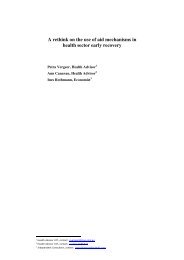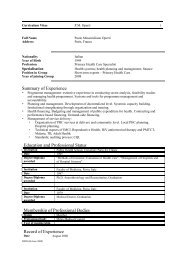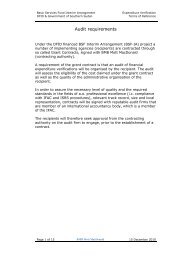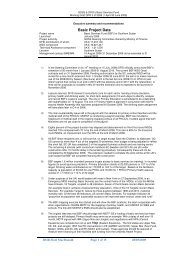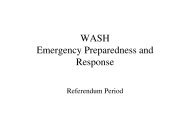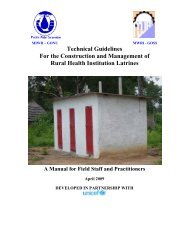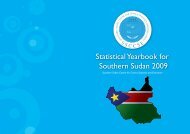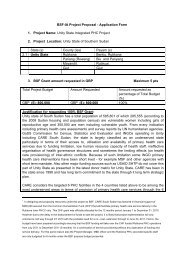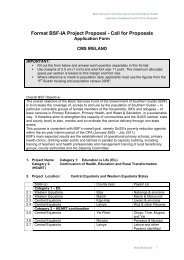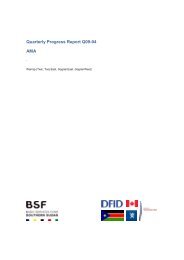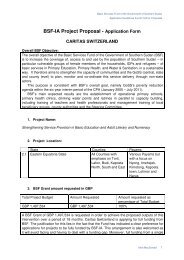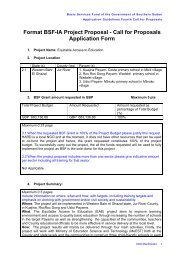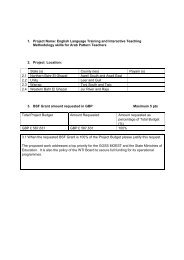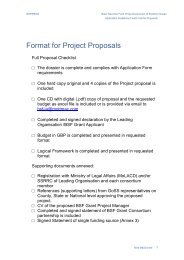Application Guidelines - Basic Services Fund SOUTH SUDAN
Application Guidelines - Basic Services Fund SOUTH SUDAN
Application Guidelines - Basic Services Fund SOUTH SUDAN
You also want an ePaper? Increase the reach of your titles
YUMPU automatically turns print PDFs into web optimized ePapers that Google loves.
<strong>Basic</strong> <strong>Services</strong> <strong>Fund</strong> Interim Arrangement (BSF-IA) of theGovernment of Southern Sudan<strong>Application</strong> <strong>Guidelines</strong> for Call for Proposals
Table of contentsList of abbreviations .................................................................................................................................. 41 Introduction .......................................................................................................................................... 51.1 BSF Interim Arrangements ....................................................................................................... 61.2 Scope and Structure ................................................................................................................. 61.3 Core Principles ......................................................................................................................... 71.4 Definition of <strong>Basic</strong> <strong>Services</strong> ...................................................................................................... 72 <strong>Fund</strong>ing conditions for BSF-IA Grant Recipients ............................................................................. 92.1 <strong>Fund</strong>ing Conditions .................................................................................................................. 92.2 Duration .................................................................................................................................. 112.3 Grant Management ................................................................................................................ 112.4 Reference Material ................................................................................................................. 112.5 Priorities under BSF-IA ........................................................................................................... 112.5.1 Geographic Areas .................................................................................................................. 112.5.2 Education Sector .................................................................................................................... 122.5.3 Health Sector .......................................................................................................................... 122.5.4 Water and Sanitation Sector................................................................................................... 133 <strong>Application</strong> Procedure ....................................................................................................................... 153.1 Category 1: <strong>Application</strong> procedure for new projects ............................................................... 153.1.1 Stage 1: Expression of Interest .............................................................................................. 153.1.2 Evaluation Criteria Expression of Interest .............................................................................. 163.1.3 Stage 2: Full Proposal ............................................................................................................ 173.1.4 Evaluation Criteria Proposal ................................................................................................... 173.2 Category 2: <strong>Application</strong> procedure for continuation of ongoing BSF primary health funded activities183.2.1 Proposal format ...................................................................................................................... 193.2.2 Proposal Evaluation ............................................................................................................... 19List of annexesAnnex 1 Sector Priority list Ministry of Education Science and Technology ................................. 20Annex 2 Priority Indicators Ministry of Health ................................................................................... 24
<strong>Basic</strong> <strong>Services</strong> <strong>Fund</strong> of the Government of Southern Sudan<strong>Application</strong> <strong>Guidelines</strong> Fourth Call for ProposalsAnnex 3 State supervisors Ministry of Water Resources and Irrigation ......................................... 26Annex 4 Timeline for <strong>Application</strong> ........................................................................................................ 27Annex 5 Format for Expression of Interests ...................................................................................... 30Annex 6 Format for Project Proposals ............................................................................................... 37Mott MacDonald 3
<strong>Basic</strong> <strong>Services</strong> <strong>Fund</strong> of the Government of Southern Sudan<strong>Application</strong> <strong>Guidelines</strong> Fourth Call for ProposalsList of abbreviationsAESAlternative Education SystemsALPAccelerated Learning ProgrammeARIAcute Respiratory InfectionBPHS<strong>Basic</strong> package of Health <strong>Services</strong>BSF<strong>Basic</strong> <strong>Services</strong> <strong>Fund</strong>BSF-IA<strong>Basic</strong> <strong>Services</strong> <strong>Fund</strong> Interim ArrangementCECCounty Education CentreCPAComprehensive Peace AgreementCHWCommunity Health WorkerDFIDUK Department for International DevelopmentECHOEuropean Commission Humanitarian OfficeEmONC Emergency Obstetric and Neonatal CareIDPInternal Displaced PersonITNInsecticide Treated NetsHMISHealth Management Information SystemGoSSGovernment of Southern SudanLQASLocal Quality Assurance SystemMDGMillennium Development GoalNGONon governmental organisationMDTFMulti Donor Trust <strong>Fund</strong>MoESTMinistry of Education Science and TechnologyMWRIMinistry of Water Resources and IrrigationOFDAOffice for Foreign Development AidPHCCPrimary Health Care CentrePHCUPrimary Health Care UnitPTAParent Teacher AssociationSCSteering CommitteeSSRRC Southern Sudan Relief and Rehabilitation CommissionTTIsTeacher Training InstitutesWASHWater Sanitation and HygieneUSAID-SHTP2 USAID Sudan Health Transformation Programme (phase 2)Mott MacDonald 4
<strong>Basic</strong> <strong>Services</strong> <strong>Fund</strong> of the Government of Southern Sudan<strong>Application</strong> <strong>Guidelines</strong> Fourth Call for Proposals1 IntroductionThe <strong>Basic</strong> <strong>Services</strong> <strong>Fund</strong> for Southern Sudan was launched in October 2005 with the organisation of the firstSteering Committee meeting chaired by the Ministry of Finance and Economic Planning. The Department forInternational Development (DFID) of the United Kingdom was the main initiator of the BSF, seeing the fund as abridging operation to deliver basic social services by non-state service providers while GoSS capacity to manage,finance and deliver social services was being built up. The objective of the <strong>Basic</strong> <strong>Services</strong> <strong>Fund</strong> is to supportimproved coverage of and access to basic education, primary health and water and sanitation services as anessential step in rebuilding the lives of communities recovering from prolonged periods of conflict. The BSF madegrant to NGOs, who deliver the vast majority of basic services in Southern Sudan.The initial design assumed that the BSF would be a short-term mechanism, with the activities, procedures anddecision-making processes rolled into the Multi Donor Trust <strong>Fund</strong> - South as the major GoSS vehicle for fundingservice delivery. However, this has not materialised as the MDTF-S experienced delays with limiteddisbursements of the funds available and gradually shifted its focus towards physical and human resourceinfrastructure, rather than service delivery.Generally speaking, three types of activity are being supported by BSF:• Construction and/or Rehabilitation: of schools (class rooms), health centres and water facilities.• Capacity Building/Training: of county health and education staff, of teachers and head masters, of nurses andmid-wives, of pump mechanics, of community groups, such as parent-teacher associations, communityhealth associations and water user associations.• Management and Operations: funding salaries, running costs and material supplies, such as drugs and textbooks.Project allocations are made through competitive Calls for Proposals. These Calls are open to NGOs and othernon-state actors. While BSF was initially funded by DFID, it generated wider donor interest in the course of 2008,due to delays with the implementation of MDTF-S. In late 2008, the Governments of Norway, Netherlands andCanada agreed to join DFID in funding a second phase of the BSF. This enabled the organisation of asubstantially larger third round of BSF grants for the period to June 2010. Overall £39 million has been awarded,through competitive selection, to 26 lead NGOs providing basic services. There are BSF interventions in betweentwo and five counties in all of Southern Sudan‟s 10 States.The BSF is one of several funding instruments available to GoSS and the donor community for post-conflictSouthern Sudan. The BSF closely follows government policy for basic services delivery and works in closecollaboration with the three relevant line Ministries in planning, coordinating and monitoring basic service deliverythrough NGO channels. For the period 2008 – 2011 GoSS has identified six medium-term expenditure priorities ofwhich three relate to basic services:• To provide free primary health care to improve the health status of the population• To provide equitable access to basic education• To increase access to safe water and sanitation.Mott MacDonald 5
<strong>Basic</strong> <strong>Services</strong> <strong>Fund</strong> of the Government of Southern Sudan<strong>Application</strong> <strong>Guidelines</strong> Fourth Call for Proposals1.1 BSF Interim ArrangementsThe previous BSF phases 1 and 2 have provided a template for systems and implementation that have beenshown to work well. It has been assessed as meeting around 10% of all needs identified by the 2005 JointAssessment Mission, also expressed as 5% of GoSS targets. The proposed new phase – the BSF InterimArrangement (BSF-IA) - is therefore designed to provide an interim arrangement building on a functioningplatform in order to ensure basic services continue to be delivered, allowing GoSS time to develop its plans andcapacity for an enhanced leadership and management role post- 2011.The BSF-IA‟s goal is to support GoSS in the expansion of primary health care, education, water and sanitation.The purpose is to expand coverage and use of these services in Southern Sudan. This will be done throughactual delivery, and by strengthening Government capacity to plan, monitor, and co-ordinate non-state servicedelivery. The BSF-IA will continue to focus its activities towards delivering services, while GoSS and developmentpartners initiate dialogue to develop sector plans to drive service delivery after the end of the CPA implementationperiod in December 2011.The BSF-IA will continue to finance NGOs to deliver basic services. This will be undertaken in two ways: i)through the continuation of NGO service delivery projects meeting the standard and demonstrating value formoney under the current BSF phase 2; and ii) a call for new proposals to expand basic service delivery coverage.As an indicative target, around 50% of BSF-IA financing will be allocated to health with the remainder splitbetween education, and water and sanitation.BSF-IA will be supported by the Governments of the Netherlands, Norway, Sweden and the United Kingdom.DFID will remain the lead donor during BSF-IA.1.2 Scope and StructureDespite the progress made in building GoSS systems and services since 2005, NGOs still deliver a largeproportion of services in Southern Sudan, and are likely to do so for some time to come. At some point in thefuture, the GoSS will take over the delivery and financing of basic social services, but to do this effectively willrequire further capacity development, some of which BSF-IA aims to provide.BSF-IA will continue to focus on providing grants to non-state service providers, and also to not for profitorganisations with a proven track record and on the basis of robust proposals for service delivery in water andsanitation, primary education and/or primary health interventions. The emphasis of this fund will be on countybased provision of health services, as well as continuing provision of basic education at county level, and waterand sanitation services. An important issue will be local ownership. The recipients have to become the “owners”of the activities. Proposals must adhere to the core principles set out below.Although non-state service providers are the implementing organisations of BSF funds, the GoSS is the owner ofthe fund. Projects funded by the BSF-IA should contribute to the GoSS‟s long-term vision of development inSouthern Sudan and be closely aligned with the Sector Plans 2010-2012 as worked out in the Budget SectorWorking Groups. BSF-IA projects should also look to work closely with the relevant GoSS line-ministries at alllevels, cementing government and community ownership of development, and building government capacity forsuch development to be sustainable.Mott MacDonald 6
<strong>Basic</strong> <strong>Services</strong> <strong>Fund</strong> of the Government of Southern Sudan<strong>Application</strong> <strong>Guidelines</strong> Fourth Call for Proposals1.3 Core PrinciplesProjects receiving grants from this fund are expected to be consistent with a MDG-poverty reduction approachand with the core principles outlined below. The application guidelines and evaluation criteria are designed toreflect and reinforce these core principles.• Work with the GoSS and local government authorities to design, implement, monitor and evaluate projectsand programmes. It is especially important to:- Involve county departments for education, health and water and sanitation in the planning ofprojects (choice of location, choice of design, beneficiaries), and later in implementation andmonitoring project progress.- Adhere to GoSS service standards and have local government administration agree onconstruction plans and detailed designs.• Employment of Sudanese nationals should be prioritised where possible at all levels of implementingorganisations.• Employ a conflict-sensitive approach to service delivery projects and programmes. At a minimum, a „do noharm‟ approach should be taken by not exacerbating existing tensions and ensuring equitable access toservices by differing and potentially conflicting community groups. Ideally, basic service provision will buildon conflict analysis to reinforce security and stability.• Link service provision to community-level demand for services through processes of communityinvolvement in and ownership of project formulation, active community participation during projectimplementation and control over the activities by the recipients.• Seek to build accountability at all levels: between non-state service providers, clients, donors, localauthorities and the GoSS. Secondment of local government staff in projects may be utilized to improvegovernment involvement and capacity building.• Ensure social inclusion by designing projects and programmes that address inequalities and are inclusiveof women, the elderly, children, different ethnicities, returnees, IDPs and refugees.• Promote partnership with, and build capacity of, local (Sudanese) non-state service providers (NGOs andprivate sector). Look for opportunities for collaboration and lesson learning.• Work to integrate service delivery. Look for opportunities to link sectors and services. Water and sanitation,education and health are intrinsically linked to improving child mortality, morbidity, gender equality andsecurity.• Work to enhance sustainability, including environmental sustainability, of project impact and servicedelivery either through local government or local organisations.• Partners will directly or through representation work with GoSS Budget Sector Working Groups to transferinterim financing onto government budgets.• Partners will work with GoSS policies and plans as they develop (including the provisions of the Non-Governmental Organisations Act and Policy <strong>Guidelines</strong>).• Develop an exit strategy where facilities constructed or rehabilitated and personnel trained can be handedover to local government. Assisting the process of government “entry strategy” through governmentcapacity building at all levels is encouraged. In addition, capacity building of local partner organisations(who in a number of cases will be the long term custodian/manager of services and assets) should also beaddressed. For example signed agreements on state budgets for salaries and running costs of facilities;MoUs; etc.1.4 Definition of <strong>Basic</strong> <strong>Services</strong>• <strong>Basic</strong> <strong>Services</strong> are understood to be primary level services provided in the Health, Education, and Waterand Sanitation sectors.• <strong>Basic</strong> <strong>Services</strong> refer to the minimum level of services:Mott MacDonald 7
<strong>Basic</strong> <strong>Services</strong> <strong>Fund</strong> of the Government of Southern Sudan<strong>Application</strong> <strong>Guidelines</strong> Fourth Call for ProposalsoooIn the Health Sector, this includes community health, PHCU, and basic and comprehensive(EmONC) levels of PHCC delivery; according to BPHS. It does not include complexhospital treatmentIn the Education Sector, this refers to Primary Education, ALP and AES, plus relatedteacher education. It does not include secondary or tertiary education.In the WASH sector, this includes rural and peri-urban water supply. It does not includewater for non-human purposes such as irrigation, and other more complex secondary ortertiary service levels.Mott MacDonald 8
<strong>Basic</strong> <strong>Services</strong> <strong>Fund</strong> of the Government of Southern Sudan<strong>Application</strong> <strong>Guidelines</strong> Fourth Call for Proposals2 <strong>Fund</strong>ing conditions for BSF-IA GrantRecipientsSection 2.1 describes the <strong>Fund</strong>ing Conditions and principles. The funding conditions are compulsory for allprojects and applicants should therefore adhere in their Expression of Interest and their Proposal to theseconditions. Any Expression of Interest or proposal not meeting the funding conditions will be disqualified withoutfurther assessment. Expressions of Interest that best reflect the funding conditions have a greater likelihood ofbeing shortlisted and proposals which best meet the funding principles have a greater likelihood of being funded.2.1 <strong>Fund</strong>ing Conditions1. The fund is open to non-state service providers.2. Projects must be related to the direct delivery of the basic services:• primary health• primary/basic education provision• water and sanitationProposals should be limited to one of the 3 sectors. It is recognized that in some cases cross-overactivities are inevitable. For example, in schools and health centres water and sanitation infrastructureshould always be included. However, to ensure efficient project coordination with GoSS, proposalsthat are limited to one sector are more likely to be funded.3. Continuation of ongoing activities already funded by BSF is encouraged by GoSS, to avoid a drop incurrent service delivery levels. This is especially important for projects in the health sector.4. In order to spread the benefits of BSF activities into new areas, the BSF-IA is seeking applications forservice delivery in priority counties not previously funded by the BSF. New projects that duplicateexisting BSF-funded activities in a certain area will not be considered.5. Projects must follow existing and developing GoSS policies, plans, priorities, and (minimum) (service)standards (see section 2.2 and the annexes for more information). They must demonstrate clearlinkages and support of local government plans (where existing) and inclusiveness, participation andcapacity building of local government authorities in planning, implementation and monitoring.6. All projects should be planned in consultation with the level of government most appropriate for theproject to be implemented (GoSS, state or county level), as well as local civil society groups whererelevant. Description and evidence to prove this consultation,must be provided as part of theapplication.7. Capacity building and learning from experience gained in the projects will be an important componentof projects funded by the BSF-IA. Applicants are encouraged to describe how the project is buildingon previous interventions and lessons learned (BSF and other, if any). Projects will be required tosystematically gather, analyse and distribute relevant project information for the benefit of futureservice delivery policies, programmes and projects in Southern Sudan. The proposal should include adescription how these elements are achieved during implementation8. The BSF-IA looks to support state and county level capacity building training and lesson learning onservice delivery planning, monitoring and coordination for government officials.9. Applicants should include plans to include government officials on monitoring and evaluation visits,including supervision of borehole drilling activities.Mott MacDonald 9
<strong>Basic</strong> <strong>Services</strong> <strong>Fund</strong> of the Government of Southern Sudan<strong>Application</strong> <strong>Guidelines</strong> Fourth Call for Proposals10. All applicants must be legally registered with the Southern Sudanese authorities (Ministry of LegalAffairs and/or SSRRC) and must have been operating in Southern Sudan or with a Sudaneseprincipal implementing partner for at least 3 years.11. The <strong>Fund</strong> will consider proposals for funding between GBP 300,000 and GBP 1,500,000. The <strong>Fund</strong>will provide either full funding or top-up funding for projects. BSF-IA funding must constitute at least50% of the total project budget, and preference will be given to applications for projects to be 100%funded by BSF-IA. If (part) co-funding is included in the proposal it should be made clear which partsare funded by other parties and what arrangements are in place in case this funding cannot berealised; consequences of this event must be specified in the proposal12. The leading organisation of the consortium must have an annual turn-over during the last 3 years of atleast twice the budget requested. This should be the turn-over of the entire organisation and not belimited to possible previous BSF activities only. Evidence to prove this must be provided as part of theapplication.13. All proposals must clearly demonstrate their adherence to the Core Principles specified in section 1.3above. Incompatibility with the Core Principles will result in disqualification.14. Proposals for water and sanitation should include adequate (borehole drilling) supervision, even if theapplicant owns its own drilling rig. This supervision should be directly coordinated with MWRI officials.Applicants should also include a budget line for geophysical siting including geo-electric profiling andsoundings (especially if they are planning to drill in the basement foundation).In addition to the conditions above, there are some guiding principles that are not compulsory but reflect theunderstanding of preferences and priorities of the Ministry of Education Science and Technology, the Ministry ofHealth and the Ministry of Water Resources and Irrigation. Proposals which best meet the funding principleshave a greater likelihood of being funded. These principles are as follows:1. Preference will be given to organisations based in Southern Sudan and to consortia combininginternational non-governmental organisations and Sudanese non-state service providers based inSouthern Sudan. Either the international or local partner could be the leading organisation of theconsortium.2. Where Sudanese organisations are in partnership with international organisations, preference will begiven to proposals which clearly demonstrate how Sudanese partners will gain experience that willlead to sustainable improvements in government‟s and/or civil society groups‟ capacity to deliverservices in the future.3. The applicant can be a single organisation or a consortium. Proposals submitted by consortia will betreated as a single application and funded through a single leading organisation. The name of theleading organisation agency must be clearly mentioned. The fund encourages local organisations tosubmit proposals and/or form part of a consortium.4. Preference will be given to proposals which allocate a greater proportion of costs to service delivery,and in particular have a lower proportion of indirect costs. Preference will be given to proposals withlow unit costs.5. Staff proposed should be presented in a way that reflects which positions are to be filled by nationalsand which positions are to be filled by internationals. Preference will be given to applications exhibitingsignificant employment of Southern Sudanese nationals at all levels.6. Proposals should be realistic, deliverable and focused. Applicants are advised not to plan overambitiousprojects and budgets, especially given an 18 month grant period from July 2010 –December 2011, i.e. a period encompassing only one full dry season.Mott MacDonald 10
<strong>Basic</strong> <strong>Services</strong> <strong>Fund</strong> of the Government of Southern Sudan<strong>Application</strong> <strong>Guidelines</strong> Fourth Call for Proposals2.2 DurationThis is the call for proposals under BSF-IA, which follows the third call for proposals under the BSF. Grants madein response to this BSF-IA call will be for a maximum of 18 months. Projects are expected to start on 1 July 2010and to be completed by end December 2011, with all funds disbursed and reconciled by February 2012. It isexpected that funding will be disbursed in arrears at monthly intervals. Organisations are expected to spend fromtheir own resources and claim for reimbursement.2.3 Grant ManagementDFID has appointed BMB Mott MacDonald as managing agent for the BSF-IA. The grants awarded under this callfor proposals will be set up and administered by BMB Mott MacDonald. BMB Mott MacDonald maintains apermanent office in Juba and delivers consultancy services to act as the <strong>Basic</strong> <strong>Services</strong> <strong>Fund</strong> InterimArrangement Secretariat. BMB Mott MacDonald will report on a regular basis to DFID, other contributingDevelopment Partners and GoSS.2.4 Reference MaterialOn the BSF website www.bsf-south-sudan.org reference material can be found which includes:• Project Documents• BSF Documents• GoSS Policies• Other relevant reportsSpecifically applicants are advised to consult the following documents which govern the management of the BSF-IA grant:• BSF general conditions• TOR expenditure verification, for conducting the financial audit at completion• Asset management and hand over policy• Standard Ministry of Water and Irrigation borehole drilling contract• DFID guidelines for Logical Framework2.5 Priorities under BSF-IAImproving service delivery results up to and beyond 2011 is a priority for the Government of Southern Sudan(GoSS). In order to generate an improved sense of ownership of the BSF-IA, the technical secretariat has held indepth consultation meetings with all three line ministries to re-discuss the sector priorities as outlined in the GOSSBSF Strategic Prioritisation Paper of October 2009. Where possible, the Ministries also identified geographicpriorities. The results of these prioritisations are presented in the following sections.2.5.1 Geographic AreasThe priority geographic areas for the provision of basic services are those that have been under-served orneglected up to now for various reasons. Applicants are encouraged to propose projects in these priority areas.The choice of geographical location for the project proposal should be guided by the following criteria:• All counties under GoSS administration are eligible for BSF-IA funding.• The minimum geographical area that may be covered by a project proposal is the county level. The projectmay encompass more than one county.Mott MacDonald 11
<strong>Basic</strong> <strong>Services</strong> <strong>Fund</strong> of the Government of Southern Sudan<strong>Application</strong> <strong>Guidelines</strong> Fourth Call for Proposals• Priority will be given to projects that provide services to vulnerable populations (which include in particularreturnees and IDPs) in the most under-serviced counties, other than those counties with activities alreadyfunded by BSF.• The BSF-IA will reject applications where duplication of service provision is apparent.To avoid applicants duplicating activities in one county, applicants must clearly coordinate their planned activities(both technically and geographically) with other stakeholders in the relevant sector.In particular with:• Government officials at county, state and National level.• Other NGOs that may apply for BSF funds through NGO forums or other existing forums.2.5.2 Education SectorThe following targets were identified as being best supported by the BSF-IA within the Education Sector.• Construct between 60 and 160 new child friendly primary schools and rehabilitate between 30 and 80 primaryschools, based upon established MoEST criteria;• Provide general in-service training for between 3,000 and 8,000 teachers, and course specific trainings forbetween 200 and 500 teachers;• AES training for 100-200 AES teachers within Southern Sudan;• Distribute learning materials within primary schools;• Support MoEST in developing the professional capacity of state and county education departments toprovide and monitor education services.During a consultation meeting that was held with the Ministry of Education, Science and Technology in March2010, the education sector priorities were re-discussed and further specified. An elaborated list of priorities pereducation sector department is attached in Annex 1. All applicants should familiarize themselves with this list andfocus their proposals on these priorities to the maximum extent possible.Annex 1 also presents a list of priority counties for construction of learning spaces and educational facilities.Applicants who are interested to propose new school construction should focus their interventions in the countiespresented on that list.2.5.3 Health SectorThe following targets were identified as being best supported by the BSF-IA in the Health Sector:• Continued provision of basic package of health services within the 25 counties currently supported by theBSF;• Provision of the <strong>Basic</strong> Package of Health <strong>Services</strong> to 10-17 new counties within Southern Sudan. This wouldinvolve coverage of primary health care provision, increasing to 50% in these counties by the end of the 18month funding cycle;• Support in-service and formal training of health workers within PHCC and PHCU (as currently provided underthe BSF);• To support the MoH in strengthening County Health Departments and community capacities for thesupervision of health services (to be specified in conjunction with the MoH).During consultation meetings between BSF and the Ministry of Health in March 2010, the following issues wereadded:• Increase the awareness of communities on basic health. Awareness raising campaigns in rural areas throughvillage health committees need to create demand of the communities to use the health services available.Mott MacDonald 12
<strong>Basic</strong> <strong>Services</strong> <strong>Fund</strong> of the Government of Southern Sudan<strong>Application</strong> <strong>Guidelines</strong> Fourth Call for Proposals• Strengthening of Governance structures such as the county health departments, village/Boma healthcommittees. To create a well functioning health sector, capacity building of these departments is necessary,which should include the harmonization of the different interventions in the health sector through differentfunding mechanisms.The Ministry of Health has identified 13 high-level impact indicators which describe the priorities in the delivery ofthe basic package of health services. All 13 indicators are equally important and the applicants are encouraged toplan their service delivery in such a way that these indicators are covered to the maximum extent possible in theirproposals. This list of indicators is presented in Annex 2.Currently, four states have Lead Agents appointed under the Umbrella Programme for Health SystemsDevelopment. These are Upper Nile state, Jonglei, Central Equatoria and Eastern Equatoria. The Ministry ofHealth wants to underline they want those organisations that are currently implementing health projects underBSF are able to continue their activities in which ever state they are located. This is to avoid a disruption in healthservice delivery and coverage.New applicants are therefore encouraged to focus their proposals on:1. States that currently do not have a Lead Agent – being Unity, Warrap, Northern Bahr el Ghazal,Western Bahr el Ghazal, Lakes and Western Equatoria.2. States/Counties that are currently not served by BSF or any of the other 4 funding mechanisms(USAID-SHTP2, OFDA, ECHO and MDTF).3. Counties under imminent threat of closure of health facilities due to funding gaps.All applicants are advised to coordinate their plans with the Ministry of Health at GoSS-level and through theSector Lead and/or Co-Sector Lead of the NGO Health Forum, which will have the latest summary information ofmain donor funding of basic health service provision throughout Southern Sudan.2.5.4 Water and Sanitation SectorAll projects funded through the BSF will be compatible with the relevant GoSS sector priorities for basic services,which are summarised in the following sections.The provision of clean water and sanitation falls under the GoSS‟ Infrastructure Sector. The 2010 InfrastructureBudget Sector Plan has set the following strategic objective; “Rehabilitate and provide infrastructure to enhance:investment, poverty reduction, economic growth and service delivery in a sustainable manner”. In addition to thedelivery of sanitation services and as part of the above mentioned objective, the Ministry of Water Resources andIrrigation (MWRI) constructs and maintains the water supply infrastructure, while also setting the policy on waterresources management, development and utilization.The following targets were set for the provision of water and sanitation within Southern Sudan during the interimperiod.• Access to clean water – increasing from under 20% to over 40% by 2011;• Construction of latrines – 4,300 new latrines to be constructed;• Construction of boreholes and other water facilities – 6,500 new borehole schemes and 3,650 rehabilitatedboreholes by 2011;• Increased awareness – regarding the importance of hygiene and sanitation in rural areas throughoutSouthern Sudan.Mott MacDonald 13
<strong>Basic</strong> <strong>Services</strong> <strong>Fund</strong> of the Government of Southern Sudan<strong>Application</strong> <strong>Guidelines</strong> Fourth Call for ProposalsThe Ministry of Water Resources and Irrigation (MWRI) intends to contribute to the above targets in the next twoyears by undertaking the following activities:• Continuation of policy development on water resources in Southern Sudan, and will be carrying outmonitoring activities to ensure the quality of infrastructure constructed;• Provision of pumps and utilisation of State transfers to provide operation and maintenance services forwater and irrigation schemes;• 1,290 new borehole schemes, rehabilitation of 520 boreholes, 600 schemes to be repaired, developmentof 92 springs/ wells, and 44 alternative water schemes to be financed and implemented through GoSS anddonors.• 12,000 co-financed household latrines, 250 institutional latrines to be financed and implemented throughGoSS and donors.The BSF‟s contribution to achieving the Infrastructure Sector‟s water and sanitation targets must sustain thecurrent gains of the BSF while seeking expansion into underserved areas. Existing and expanded interventionswill take the following form depending on resources available.• Rehabilitate or construct between 900 and 2,500 latrines;• Training of between 150-800 pump-mechanics (with particular attention for training female pumpmechanics);• Provision of 300-1,400 water points including new borehole schemes, rehabilitated boreholes, and otherwater intakes (e.g. hafirs, water harvesting etc);• Consistent training, in line with GoSS policy, on hygiene and sanitation in rural communities (as currentlybeing implemented under the BSF);• Institutional support to state and county water and sanitation departments in conjunction with the MWRI(e.g. establishment of systems and procedures, capacity building, provision office equipment, spare parts)Like in the rest of developing Africa, sanitation and hygiene promotion activities, to a large extent, were laggingbehind. However, it should be noted that the trend in the WASH sector in Southern Sudan is, like the regional andworldwide trend, towards sanitation and water for all activities, with therefore more emphasize on sanitation andhygiene promotion activities.Furthermore, an estimated 40 – 65 % of the current water points in Southern Sudan are out of order.Development of new water points should therefore not be prioritized above the rehabilitation of existing waterpoints. Both activities should be planned parallel.In the Water and Sanitation Sector, the coverage of basic water supply and sanitation needs to be increasedsignificantly throughout Southern Sudan. The Ministry of Water Resources and Irrigation therefore welcomesBSF-IA proposals in all states and counties, without prioritising specific areas.The Directorate of Rural Water Supply and Sanitation of the Ministry of Water Resources and Irrigation in Jubahas appointed supervisors per state. These supervisors coordinate the water and sanitation activities in the statesthey are appointed to. A list of supervisors per state is attached in annex 3. In addition to coordinating theirproposed project at county and state level, applicants that propose to work in the water and sanitation sector haveto coordinate their plans with the state supervisors.Mott MacDonald 14
<strong>Basic</strong> <strong>Services</strong> <strong>Fund</strong> of the Government of Southern Sudan<strong>Application</strong> <strong>Guidelines</strong> Fourth Call for Proposals3 <strong>Application</strong> ProcedureThe BSF-IA call for proposals distinguishes between two application categories.• Category 1 consists of applications for new project proposals• Category 2 consists of applications for the continuation of primary health care activities currently fundedby BSF.The two categories use different application procedures which are described below in section 3.1 and 3.2. Annex4 presents a detailed timeline for both categories. Organisations that are eligible to submit applications undercategory 2 are waived from submitting an expression of interest and can directly go to section 3.1.3 on page 17.3.1 Category 1: <strong>Application</strong> procedure for new projectsIt is appreciated that the preparation of proposals is a time consuming exercise and a proposal should thereforehave a reasonable chance of being selected. The tender procedure for new projects is therefore broken down intwo stages, as described in the following sections.3.1.1 Stage 1: Expression of InterestAfter the date of publishing the announcement for the BSF-IA call for proposals, interested parties will have oneweek to submit an Expression of Interest. Applicants must adhere to the Format for BSF-IA Expression ofInterests, as presented in Annex 5. Failure to do so will result in disqualification.The expression of interest format consists of the following sections:1. Project Synopsis for the project to be proposed, with approximation of funds to be requested. Theproject synopsis should be no longer than half a page.2. Contact and registration data on all partners of the consortium3. Information on financial capacity for the lead partner. This data needs to be substantiated byaudited annual accounts. The leading organisation should have an annual turnover during the lastthree years, of at least twice the requested budget. The cash and cash equivalents should bepositive at the beginning and the end of the year, for the last three years. The Expression ofInterests will not be evaluated further when these requirements are not met.4. Information on operational capacity of the different partners of the consortium.5. Relevant previous project experience. A maximum of 5 project references per consortium ofrelevant projects carried out in the last 3 years must be submitted.All Expression of Interests must be delivered by 17.00 hrs Sudanese time on 1 April 2010. Four (4) hard copiesand one (1) electronic copy must be submitted before the deadline. All late arrivals will be disqualified.The four hard copies, must be sent to BMB Mott MacDonald c/o <strong>Basic</strong> Service <strong>Fund</strong> Secretariat , Plot 31-3K,South, 1 st Class Residential Area, Juba town South, South Sudan (+256 477113944), in an envelope clearlymarked: BSF-IA – Expression of Interest -{Name leading organisation })Mott MacDonald 15
<strong>Basic</strong> <strong>Services</strong> <strong>Fund</strong> of the Government of Southern Sudan<strong>Application</strong> <strong>Guidelines</strong> Fourth Call for ProposalsThe electronic copy in PDF format must be sent to: bsf-ia@mottmac.com (subject header: BSF-IA-Expression ofInterest-{Name leading organisation })3.1.2 Evaluation Criteria Expression of InterestThe evaluation committee comprising GoSS representatives, independent sector experts and BSF-IA Secretariatstaff, will take one week to evaluate the Expressions of Interest. A separate meeting will be held per line ministryfor these evaluations. The objective of these meetings is to agree upon a final shortlist presenting the applicantsthat will be invited to submit a full proposal.The applicants on the shortlist will be notified within 1 week after submitting the Expression of Interest.The different sections in the expression of interest format in annex 5 will be scored separately and can receive themaximum score presented in table below. The numbering is consistent with the proposal application format. TheEvaluation Committee of BSF-IA will give priority to the applications with the highest scores while maintaining anoverall, equitable, geographical balance.SECTIONMAX POINTS1 Project Synopsis and <strong>Fund</strong>s Requested 451.1 Is the project synopsis relevant for BSF activities? 101.2 Is the project synopsis addressing sector priorities as described in the application 10guidelines?1.3 Is the project synopsis targeting priority counties for the sector as defined by the 10different line ministries in the application guidelines?1.4 Does the project synopsis mention capacity building, sustainability and exit10strategy as a specific part of the project?1.5 Is the proposed project 100% funded by BSF funds? 53 Financial Capacity3.1.1 Is the annual turn-over of the leading organisation in the last 3 years at least YES/NOtwice the funds requested?3.1.2 Is the cash and cash equivalent of the leading organisation in the past 3 years YES/NOpositive both at the beginning and the end of the year?4 Operational Capacity 204.1 Does the leading organisation have an office in Southern Sudan? 104.2 Does the consortium as a whole have a sufficient presence in Southern Sudan to 10be able to implement the proposed project?5 Relevant Previous Experience 355.1 Does the leading organisation have experience managing projects with the10requested budgetPer reference 1-5:-Is the applicant the leading organisation:1-Is the geographic location relevant to the proposed project:1-Does the project cover one of the BSF activities (<strong>Basic</strong> Education/ Primary1healthcare/ <strong>Basic</strong> Water Supply and Sanitation)-Is the experience relevant for the proposed project:1-Is the budget managed over £ 300,0001(5x5 = 25)TOTAL 100Mott MacDonald 16
<strong>Basic</strong> <strong>Services</strong> <strong>Fund</strong> of the Government of Southern Sudan<strong>Application</strong> <strong>Guidelines</strong> Fourth Call for ProposalsThe organisations which are selected to write a full proposal will be allowed 4 weeks to finalise their projectproposal. The proposals have to be in conformity with the <strong>Application</strong> <strong>Guidelines</strong> for the BSF-IA Call for Proposalsand the proposal format that is presented in more detail in section 3.1.3.3.1.3 Stage 2: Full ProposalAll applications must follow the format specified in annex 6 of this document. <strong>Application</strong>s departing from thisformat will be disqualified.• A consortium must submit a signed partnership agreement with the full proposal.• All proposals should be accompanied by recommendation letters from the relevant GoSSrepresentative on county / state level in which the work is to be carried out, and from no more than twoother referees per partner. If the proposal addresses cross-over issues between sectors, the applicantshould provide prove of coordination between the different line ministries involved.• To avoid duplication, all applicants must declare that they will not acquire funds from alternativesources for the same activity in the same location.• Deadline for applications in category 1: 17.00 hrs Sudanese time on 6 May 2010• Deadline for applications in category 2; 17.00 hrs Sudanese time on 23 April 2010• The submission document must contain:Five (5) hard copies and one (1) electronic copy, in Microsoft Word, Excel and/ or PDF format, must besubmitted with a signed covering letter in PDF format before the deadline. An acknowledgement will besent by email to the submitting party specifying the time and date the electronic application wasreceived. Documents which do not comply will be disqualified.• All five hardcopies must be delivered to the office of BMB Mott MacDonald, c/o <strong>Basic</strong> Service <strong>Fund</strong>Secretariat , Plot 31-3K, South, 1 st Class Residential Area, Juba town South, South (+256 477113944).Envelopes should be clearly marked: BSF-IA -Proposal-{Name leading organisation }• All applications should be electronically submitted to: bsf-ia@mottmac.com (subject header: BSF-Proposal-{Name leading organisation}) before the deadline.The BSF Secretariat will work according to DFID procedures reporting and monitoring criteria which are availableon the BSF website. These criteria must be adhered to.Decisions of the BSF Steering Committee will be final and no appeal process will be allowed. In submitting anapplication to the BSF-IA, the applicant agrees to these conditions and rules. The BSF Secretariat may check thevalidity of any information submitted by applicants, at its own discretion.3.1.4 Evaluation Criteria ProposalThe evaluation committee comprising GoSS representatives, independent sector experts and BSF-IA Secretariatstaff will evaluate the proposals received. The outcome of the evaluation will be discussed for approval by theBSF Steering Committee comprised of officials from the GoSS, BSF-IA donor representatives and representativesfrom civil society,The different sections in the proposal format can receive the maximum score presented in table below. Thenumbering is consistent with the proposal application format.The BSF Steering Committee will give priority to the applications receiving the highest technical scores whilemaintaining an overall, equitable, geographical balance.Mott MacDonald 17
<strong>Basic</strong> <strong>Services</strong> <strong>Fund</strong> of the Government of Southern Sudan<strong>Application</strong> <strong>Guidelines</strong> Fourth Call for ProposalsMaximum pointsSection3. Budget 53.1 Is the proposal funded by BSF for 100%? 56 Justification 406.2 Does the proposed project address the GoSS sector priorities as described in the10application guidelines?6.3 Does the proposed project target priority counties as defined by GoSS in the20application guidelines?6.5 Are woman and girls specifically targeted? 107 Activities 57.2 Are the roles of the international and local partners specified for each output and5activities?8 Methodology 358.1 Does the consortium present a clear method of implementation, reasons for the5proposed methodology and how the project is intended to build on previous interventionsand lessons learned (BSF and other, if any)?8.3 Is the BSF programme manager capable to successfully lead the team to carry out the10tasks?8.4 Are strategic partnerships with government and other partners for effective project10implementation defined, and do they play a major role throughout the proposal?8.5 Does the proposal clearly describe an appropriate NGO exit-strategy and an entrystrategyfor government or civil society partners to ensure that project activities be10continued by in a sustainable manner after project closure?9 Results/deliverables 59.2 Does the proposal describe a realistic plan to measure the indicators for project5success?10 Efficiency 510.2 Does the proposal include unit costs of main deliverables?5(For example per classroom, borehole, PHCU, latrine, teacher training programme,community health committee training, etc.) Is the proposed expenditure in line withaverages observed elsewhere in Southern Sudan?11 Impact 511.1 How likely is the proposal to have a tangible impact on its target groups? Positive and5negative, short-term and longer-term, direct and indirect, intended and unintendedoutcomes?Total 1003.2 Category 2: <strong>Application</strong> procedure for continuation of ongoing BSFprimary health funded activitiesTo be able to ensure continuation of ongoing primary health care activities in the counties currently served underthe BSF programme, a separate application procedure is set-up for those organisations that are currentlyimplementing a contract in the health sector under BSF. The reason for this is to avoid a significant drop inservice delivery level would these activities be discontinued, and to avoid losing trained staff and efficient workingrelations with local parties that have been established during the previous phase of BSF. In addition, the contractsMott MacDonald 18
<strong>Basic</strong> <strong>Services</strong> <strong>Fund</strong> of the Government of Southern Sudan<strong>Application</strong> <strong>Guidelines</strong> Fourth Call for Proposalsof the current organisations will expire on June 30 2010, and sufficient notice needs to be given for them to eitherdemobilise or continue.Leading organisations that are currently implementing health projects funded through the BSF programme, andare performing well, will be directly invited to submit a new proposal. These leading organisations will be exemptfrom submitting an Expression of Interest and are directly requested to submit a full proposal.In the health sector we expect applicants to continue service delivery in the health units and centre that they haveestablished under previous BSF funding.The proposal submitted through this shorter application procedure must meet the following criteria:1. The proposal must be submitted under the same leading organisation.2. The consortium must propose a project that builds on the activities currently being implemented.3. The proposal should clearly demonstrate the lessons learned from the previous phase and how theselessons learned are incorporated in this new proposal to strengthen the impact of the activities3.2.1 Proposal formatFor the submission of category 2 proposals, the applicant should adhere to the same procedures for proposalsubmission described in section 3.1.3 of this application guideline.Throughout the proposal, the applicant should clearly demonstrate why there is a need to continue the services,what lessons are learned during the previous phase, and how these lessons learned are incorporated in the newsubmission.3.2.2 Proposal EvaluationThe Proposals will be evaluated by a team comprising of GoSS representatives, independent sector experts andBSF-IA Secretariat staff.To ensure an equal and transparent application procedure for both categories, the proposal evaluation grid usedwill be the same for both categories. For those organisations that have previously worked with BSF, their pastperformance will be taken into account as well as remedial measures taken to address performance issues.There is no guarantee that proposals submitted under category 2 will be awarded a contract automatically.Mott MacDonald 19
<strong>Basic</strong> <strong>Services</strong> <strong>Fund</strong> of the Government of Southern Sudan<strong>Application</strong> <strong>Guidelines</strong> Fourth Call for ProposalsAnnex 1 Sector Priority list Ministry ofEducation Science and TechnologyThe following BSF-specific priorities and conditions should be targeted by NGO that apply for funds in theEducation Sector:Teacher Education:Priorities to GoSS-MoEST:1. English language training for Arabic pattern teachers2. In-service teacher education modules, where NGOs target groups of trainee teachers that usesuccessive modules that can be taught over an 18-month cycle, between 1 July 2010 and 31 December2011.3. NGOs to work through the CEC system when working in the area of in-service teacher education, ifapplicable4. Support to training material printing and dissemination to be targeted by NGOs.5. Pre-service teacher education in primary education (18-month course targeting secondary schoolgraduates – at the end of the course, trainees are given a certificate in primary education.)6. NGOs to work through the TTIs system in the area of pre-service teacher education.7. Support to TTIs by NGOs encouraged – materials, professional skills development of TTI staff,enhancing communication between TTIs/SMoEST/GoSS level, etc.8. Support to SMASESS roll-out at SMoEST and CED levels9. Distance learning programmes for teachers to be considered, and possible support to developingdistance learning policyConditions/cross-cutting issues for Teacher Education:• NGOs to use only GoSS training manuals and guidelines (available from GoSS-MoEST)• Selection of teachers for training should be done together with government at SMoEST and CED levelsand in accordance with GoSS guidelines• Inclusion of more management training / leadership formation at SMoEST and CED level, includingprovision for government personnel in the NGO monitoring process• Monitoring of training activities must be done to GoSS criteria, together with SMoEST and CED level.Budget provision must be made for this process.• Specific focus must be given to bring female teachers into the systemConstruction of learning spaces and educational facilities:Priorities to GoSS-MoEST:1. Construction of primary schools as per the following guidelines:Mandatory features to be included:• 8 classrooms,• office block (offices, staff room, 1 store/library),Mott MacDonald 20
<strong>Basic</strong> <strong>Services</strong> <strong>Fund</strong> of the Government of Southern Sudan<strong>Application</strong> <strong>Guidelines</strong> Fourth Call for Proposals• separate latrines for boys, girls and teachers,• safe water sourceExtra features to target gender equity in access / teaching quality (as applicable):• fences,• dormitories,• comfort kit distribution,• teachers‟ accommodation,• management trainings,• assistance with payroll,• feeding programmes including kitchen/food store,• access for special need students,• school gardens/agriculture project• guttering and facilities for water storageConditions/cross cutting issues for Construction:• Use GoSS template design (available from GoSS-MoEST) and quality guidelines for permanentmaterials;• Selection of sites must be by GoSS criteria at SMoEST and CED levels; NGOs should provide capacitybuilding support to SMoESTs and CEDs in construction contracting processes• Monitoring of construction quality must be done to GoSS criteria, together with SMoEST and CED level.Budget provision must be made for this process.Alternative Education Systems (AES):Priorities to GoSS-MoEST:1. Expansion of pastoralist education programme across Southern Sudan; training of pastoralist teachersusing ALP curriculum (one month training modules)2. Printing and distribution of AES curriculum materials (ALP, Intensive English, <strong>Basic</strong> Adult LiteracyMaterials, Community Girls Schools materials)3. Printing and distribution of ALP training materials and manuals4. Provision of teaching equipment and materials (blackboards, ex. Books) for AES centers5. Provision of mobile teacher kits for pastoralist teachers (gumboots, bedding, mosquito net, rain coat, etc)6. Supporting girls‟ education advocacy and literacy campaigns (printing of materials, carrying out ofworkshops) in connection with state Steering CommitteesTeaching and Learning materials:Priorities to GoSS-MoEST:1. Distribution of reference materials2. Distribution of P1-P8 textbooks (Southern Sudan Curriculum)3. Distribution of Primary school syllabus (Southern Sudan Curriculum)4. Distribution of PTA and school management manuals5. Distribution of stationeries and school equipment (blackboards, furniture, etc)Mott MacDonald 21
Capacity building/cross cutting issues:<strong>Basic</strong> <strong>Services</strong> <strong>Fund</strong> of the Government of Southern Sudan<strong>Application</strong> <strong>Guidelines</strong> Fourth Call for Proposals1. Grant Recipients to target PTA / Boards of Governors trainings at schools in counties operated in2. Grant Recipients to target professional skills development for education management at all levels:inclusion of more management training / leadership formation at SMoEST and CED level, assistance indata collection, ICT training, etc.3. The BSF Secretariat and the Grant Recipients should recognize their role in supporting GoSS-to-stateand state-to-county communication and dissemination of government guidelines / documents,regulations, priorities, etc. (through the BSF Website and email) as part of the capacity building andgovernment “entry strategy”.4. Grant Recipients to support the payroll system roll-out where possibleWhile institutional capacity building is a priority for the MoEST-GoSS, direct capacity building projects are not themandate of the <strong>Basic</strong> <strong>Services</strong> <strong>Fund</strong>. However, BSF expects that all projects have a state and county capacitybuilding component built in with regard to the other four priorities.Mott MacDonald 22
<strong>Basic</strong> <strong>Services</strong> <strong>Fund</strong> of the Government of Southern Sudan<strong>Application</strong> <strong>Guidelines</strong> Fourth Call for ProposalsMoEST priority targeted counties for school construction 2010-2012Central Equatoria:Terekeka CountyMorobo CountyKajo-Keji CountyEastern Equatoria:Budi CountyLapon CountyKapoeta East CountyMagwi CountyWestern Equatoria:Mvolo CountyTambura CountyNzara CountyLakes:Rumbek East CountyRumbek Centre CountyAwerial CountyJonglei:Uror CountyNyirol CountyAyod CountyFangak CountyUnity:Pariang CountyMayon CountyRubkona CountyWarrap:Gogrial West CountyTwic CountyTonj South CountyUpper Nile:Maiwut CountyNasir CountyUlang CountyWestern Bahr El-Ghazal:Jur River CountyRaja CountyNorthern Bahr-El Ghazal:Aweil North CountyAweil East CountyAweil West CountyMott MacDonald 23
<strong>Basic</strong> <strong>Services</strong> <strong>Fund</strong> of the Government of Southern Sudan<strong>Application</strong> <strong>Guidelines</strong> Fourth Call for ProposalsAnnex 2 Priority Indicators Ministry ofHealthIndicator Baseline 1 ApproximateTarget 2Means for Data Collection1) % children 12 to 23 months old who receivedDPT3/measles vaccine before the age of 12 months2) % children under 5 sleeping under an ITN thenight before the survey3) Vitamin A coverage: among children 6-59 months% receiving it in the last 6 months4) Antenatal care from skilled providers %, amongwomen giving birth in the last 2 years67.5% 85% 1) HMIS2) LQAS3) National HH Survey9.4% 3 35% 1) LQAS2) National HH Survey65.6% 80% 1) HMIS2) LQAS3) National HH Survey27.5% 40% 1) HMIS2) LQAS3) National HH Survey5) Skilled* birth attendance in a health facility. 15.2% 25% 1) HMIS2) LQAS3) National HH Survey6) Family planning – Contraceptive** prevalence ratefor modern methods.1.6% 7% 1) LQAS2) National HH Survey7) Treatment of diarrhea, ARI, malaria – out-patientvisits among
<strong>Basic</strong> <strong>Services</strong> <strong>Fund</strong> of the Government of Southern Sudan<strong>Application</strong> <strong>Guidelines</strong> Fourth Call for Proposals12) Drug supply: % of facilities having 10 essentialdrugs*** at the time of supervisory visit.13) Knowledge of health workers in managingimportant ailments as judged by clinical vignettesNA 80% 1) QSC2) health facility surveyNA 40% 1) QSC2) health facility surveyMott MacDonald 25
<strong>Basic</strong> <strong>Services</strong> <strong>Fund</strong> of the Government of Southern Sudan<strong>Application</strong> <strong>Guidelines</strong> Fourth Call for ProposalsAnnex 3 State supervisors Ministry ofWater Resources and IrrigationSTATESUPERVISORSCentral EquatorialAlison Juma Dumuko (Team Leader)Charles Lado Brown (Member)WarrapAlbert Aluzai Moni (Team Leader)Robert Mori Patrick (Member)UnityEphraim Modi Loburang (TeamLeader)Makal Ter GoachEaster EquatorialAchuoth Makwec Riak (Team Leader)Simon Nyagong Jubek (Member)LakesCharles Lopero Mario (Team Leader)Mayom Tor Dau (Member)JongleiDuku Kenge Stephen (Team Leader)Juma Makoi Yai (Member)Upper NileKuol Alwong (Team Leader)Western Bahr ElGhazalFlora Davit Paul (Team Leader)Northern Bahr ElGhazalPeter Jalyath Saveiro(Team Leader)Isaac Ishmail Jambi (Member)Western EquatoriaZainab Gailo Jambo(Team Leader)Mott MacDonald 26
<strong>Basic</strong> <strong>Services</strong> <strong>Fund</strong> of the Government of Southern Sudan<strong>Application</strong> <strong>Guidelines</strong> Fourth Call for ProposalsAnnex 4 Timeline for <strong>Application</strong>Timeline for Category 1: New projectsDatesActivity26 February2010End grace period for contract award/ Start BSFIA26/2-24/3Drafting new application guidelines 4 th call for proposals for consultation with line ministries,DFID and other stakeholders3 March Arrival inception team coordinator3/3-24/3Consultations with line ministries/ DFID/ NGO Forum/ NGO Health Forum about applicationguidelines 4 th call for proposals in preparation of SC meeting3/3-24/3 Adjustment General Conditions22/3-24/3 Preparation of SC no. 24 meeting to discuss application guidelines for 4th call for proposals24 March SC meeting no 24 : Discussion of draft application guidelines and selection criteria25 MarchLaunch of BSF 4 th Round: Announcement of 4 th Call for Proposal on the BSF website:http://www.bsf-south-sudan.org25/3-1/4 (1week)Period for NGOs to prepare Expression of Interest for 4th Call1 AprilDeadline for submission of Expression of Interests: all Expression of Interests to be deliveredat BSF Secretariat in Juba6/4Consultations of GOSS officials and BSFIA consultants on assessment of Expression ofInterests1/4-6/4 Appraisal of Expression of Interests and Preliminary Ranking7/4 Announcement of short-list8 April NGO information meeting8/4-6/5 4 week Period for NGO‟s to prepare full project proposals4/5-6/5Training of assessment team that will score and rank proposals; assessment teams to becomposed of mix of GOSS officials and BSF-IA consultants6 MayDeadline for submission of Project Proposals: all Full Proposals to be delivered at BSFSecretariat in Juba7/5-20/5 Scoring of proposals by BSF-IA assessment team and sub-committees per line ministry.21/5-25/5Preparation of SC no. 25 meeting to discuss Full Proposals; prepare summary report andPowerPoint presentation for SC26 May (1)SC meeting no 25: discuss preliminary ranking prepared by assessment teams and finalisethe selection of organisationsAnnouncement of contract awards and invitation for contact negotiations to selected NGOs28 May NGOs who are not selected will receive a detailed response why their proposal was notsuccessfulMott MacDonald 27
<strong>Basic</strong> <strong>Services</strong> <strong>Fund</strong> of the Government of Southern Sudan<strong>Application</strong> <strong>Guidelines</strong> Fourth Call for ProposalsTimeline for Category 1: New projectsDatesActivity31/5-11/6Contract negotiations in Juba with selected NGO; review, amendments and finalisation ofproject budgets5/6-11/6 Drafting of Inception Report14 JuneIMAC meeting in Juba: to provide a summary of BSF application process and a summary ofprojects to be funded during the Fourth Round.BMB Mott MacDonald issues contracts to selected NGOs15/6 – 30/6Preparation and Mobilisation time for NGOs1 July 2010 Start of Fourth Round of BSF projects7 July Kick off meeting with NGOsMott MacDonald 28
<strong>Basic</strong> <strong>Services</strong> <strong>Fund</strong> of the Government of Southern Sudan<strong>Application</strong> <strong>Guidelines</strong> Fourth Call for ProposalsTime line for Category 2: continuation of primary health care activities currentlyfunded through BSFDates Activity26 February2010End grace period for contract award/ Start BSFIA26/2-24/3 Drafting new application guidelines BSF-IA call for proposals3 March Arrival inception team coordinatorConsultations with line ministries/ DFID/ NGO Forum/ NGO Health Forum about application3/3-24/3 guidelines BSF-IA call for proposals in preparation of SC meetingAdjustment General Conditions22/3-24/3 Preparation of SC no. 24 meeting to discuss application guidelines for BSF-IA call for proposals24 March SC meeting no 24 : Discussion of draft application guidelines and selection criteriaLaunch of BSF 4 th Round: Announcement of 4 th Call for Proposal on the BSF website:http://www.bsf-south-sudan.org. Identification of NGO's interested to continue ongoing activities25 Marchunder the BSF programme.Invite the organisations identified to prepare a proposal.8 April NGO information meeting (this is a combined meeting for applications in Category 1 and 2)27/3-23/3 4 week Period for NGO‟s with ongoing projects to prepare full project proposals21/4-22/4Training of assessment team that will score and rank proposals; assessment teams to becomposed of mix of GOSS officials and BSF-IA consultants23 AprilDeadline for submission of Project Proposals for ongoing projects: all Full Proposals to bedelivered at BSF Secretariat in Juba26/4-7/5 Scoring of proposals by BSF-IA assessment team and sub-committees per line ministry.10/5-11/5Preparation of SC no. 25 meeting to discuss Full Proposals; prepare summary report andPowerPoint presentation for SC12 MaySC meeting no 25: discuss preliminary ranking prepared by assessment teams and finalise theselection of organisationsAnnouncement of contract awards and invitation for contact negotiations to selected NGOs14 May NGOs who are not selected will receive a detailed response why their proposal was notsuccessful17/5-31/6Contract negotiations in Juba with selected NGO; review, amendments and finalisation ofproject budgets1/6 – 15/6 BMB Mott MacDonald issues contracts to selected NGOs14 JuneIMAC meeting in Juba: to provide a summary of BSF application process and a summary ofprojects to be funded during the Fourth Round.16/6-30/6 Preparation and Mobilisation time for NGOs1 July 2010 Start of Fourth Round of BSF projects7 July Kick off meeting with NGOsMott MacDonald 29
<strong>Basic</strong> <strong>Services</strong> <strong>Fund</strong> of the Government of Southern Sudan<strong>Application</strong> <strong>Guidelines</strong> Fourth Call for ProposalsAnnex 5 Format for Expression ofInterestsExpression of Interest Checklist□ The dossier is complete and complies with <strong>Application</strong> Formrequirements□ One hard copy original and 3 copies of the Expression of Interestis included□ One CD with digital (.pdf) copy of Expression of Interest is includedor is provided via email to bsf-ia@mottmac.com□ Approximation of funds requested is in GBPSupporting documents annexed:□ Annual audited accounts of the leading organizationMott MacDonald 30
<strong>Basic</strong> <strong>Services</strong> <strong>Fund</strong> of the Government of Southern Sudan<strong>Application</strong> <strong>Guidelines</strong> Fourth Call for ProposalsFormat for the submission ofExpressions of Interest for BSF-IA1. PROJECT SYNOPSIS, LOCATION and FUNDS REQUESTEDDescribe briefly the proposed project. Include objective and purpose of the project, location of implementation(State and county) and state how capacity building for sustainability is addressed.Refer to the list of sector priorities and the list of priority counties where applicable.Also state the amount that the organization intends to request from the BSF-IA fund. As this is still the Expressionof Interest stage, figures will be read as approximations. A full detailed budget is not necessary at this stage.Name of Lead Organisation:Project Title:Location of Project: State: Counties:Total eligible cost of the Project(£):Amount requested (£): % of total cost of the Project (£):Project Synopsis (max 0.5 page)Mott MacDonald 31
<strong>Basic</strong> <strong>Services</strong> <strong>Fund</strong> of the Government of Southern Sudan<strong>Application</strong> <strong>Guidelines</strong> Fourth Call for Proposals2. CONSORTIUM ORGANISATIONPlease provide information on the organisation or consortium, according to the below given tables.2.1 Leading OrganisationFor the leading organisation of the consortium provide following information:Full legal nameAcronymNationalityYear of foundationMain area of expertiseRegistration with SSRRCRegistration with Min of LegalAffairsContact personTelephone numberWebsiteEmail addressLeading Organisation2.2 Partners in the consortium – other than the leading organisationThe following table has to e completed for each member of the consortium; fill out 1 table per consortiummember. Please provide the following information:Partner 1Legal or business nameAcronymLegal statusNationalityYear of foundationMain area of expertiseContact person Name: Email:Chief Executive Officer orDirector and duty station(as applicable)Name:Email:Chairman of the Board of Name:Trustees/Governors(as applicable)Telephone numbersWebsite address(Add/delete as many tables as necessary for all partners of the consortium)Email:3. FINANCIAL CAPACITYThis information will be used to assess whether the applicant has sufficient and stable source of finance, andwhether the applicant has sufficient operational and management capacity to manage a project for which theapplicant is requesting a grant.Mott MacDonald 32
<strong>Basic</strong> <strong>Services</strong> <strong>Fund</strong> of the Government of Southern Sudan<strong>Application</strong> <strong>Guidelines</strong> Fourth Call for Proposals3.1 Financial management experience leading organisationFor the leading organisation only, complete table below:Leading OrganisationMain funding sources(donors, donations),provide list starting withmain source1.2.3.4.2.1.1 Annual turn-overduring last three years2007 2008 20092.1.2 Cash and cashequivalent at the beginningand the end of the year, forthe last three years.2007 2008 20093.2 Externally audited accountsInclude the externally audited accounts for the leading organisation, for any of the years 2009, 2008 or 2007. Thedocument should be attached to this application form.4. OPERATIONAL CAPACITYInformation in this section will be used to assess whether applicants have sufficiently qualified staff to manageand carry out the operations in Southern Sudan.Provide details on the different locations the leading organisation is based, and on the number of permanent staffresources by category in each of those locations. Please add all offices in Southern Sudan, including field bases.Mention all locations in Southern Sudan separately. Add rows for more locations when necessary.Leading OrganisationLocation Head Quarters:Staff category: Number: Number of which have Sudanesenationality:-Management / Financial Staff:-Technical Staff:-Support Staff:Mott MacDonald 33
<strong>Basic</strong> <strong>Services</strong> <strong>Fund</strong> of the Government of Southern Sudan<strong>Application</strong> <strong>Guidelines</strong> Fourth Call for ProposalsLocation (other) office in South Sudan:Staff category: Number: Number of which have Sudanesenationality:-Management / Financial Staff:-Technical Staff:-Support Staff:Partner 1:Location Head Quarters:Staff category: Number: Number of which have Sudanesenationality:-Management / Financial Staff:-Technical Staff:-Support Staff:Location (other) office in South Sudan:Staff category: Number: Number of which have Sudanesenationality:-Management / Financial Staff:-Technical Staff:-Support Staff:(Add/delete as many tables as necessary for all partners of the consortium)5. RELEVANT PREVIOUS EXPERIENCEProvide a maximum of 5 project references of the whole consortium (Leading organisation and other partnerstogether) relevant to the fields covered by BSF-IA, namely Primary Education and/or Primary Health and/or Water& Sanitation. The selection must be limited to projects implemented in the last 3 years (2007, 2008, 2009). If areference is for a project in Southern Sudan, specify which counties were targeted.The information in this section will be used to assess whether the consortium has sufficient experience ofmanaging project in the relevant sector and of a comparable scale to the one for which the consortium isrequesting a grant.Use the format below for the selected references:Mott MacDonald 34
<strong>Basic</strong> <strong>Services</strong> <strong>Fund</strong> of the Government of Southern Sudan<strong>Application</strong> <strong>Guidelines</strong> Fourth Call for ProposalsReference 1Name of consortium partner implementing this project:Brief description of project:(State the objective, main results and lessons learned. Do not use more than 0.25 page)Were you lead (stateyes or no)Location <strong>Fund</strong>ing source Amount managed byyour organisation (£)Start date- enddateReference 2Name of consortium partner implementing this project:Brief description of project:(State the objective, main results and lessons learned. Do not use more than 0.25 page)Were you lead (stateyes or no)Location <strong>Fund</strong>ing source Amount managed byyour organisation (£)Start date- enddateReference 3Name of consortium partner implementing this project:Brief description of project:(State the objective, main results and lessons learned. Do not use more than 0.25 page)Were you lead (stateyes or no)Location <strong>Fund</strong>ing source Amount managed byyour organisation (£)Start date- enddateMott MacDonald 35
<strong>Basic</strong> <strong>Services</strong> <strong>Fund</strong> of the Government of Southern Sudan<strong>Application</strong> <strong>Guidelines</strong> Fourth Call for ProposalsReference 4Name of consortium partner implementing this project:Brief description of project:(State the objective, main results and lessons learned. Do not use more than 0.25 page)Were you lead (stateyes or no)Location <strong>Fund</strong>ing source Amount managed byyour organisation (£)Start date- enddateReference 5Name of consortium partner implementing this project:Brief description of project:(State the objective, main results and lessons learned. Do not use more than 0.25 page)Were you lead (stateyes or no)Location <strong>Fund</strong>ing source Amount managed byyour organisationStart date- enddateMott MacDonald 36
<strong>Basic</strong> <strong>Services</strong> <strong>Fund</strong> of the Government of Southern Sudan<strong>Application</strong> <strong>Guidelines</strong> Fourth Call for ProposalsAnnex 6 Format for Project ProposalsFull Proposal Checklist□ The dossier is complete and complies with <strong>Application</strong> Formrequirements□ One hard copy original and 4 copies of the Project proposal isincluded to be submitted to BSF Secretariat in Juba□ One CD with digital (.pdf) copy of proposal and the requestedbudget as excel file is included or is provided via email to bsfia@mottmac.com□ Completed and signed declaration by the Leading Organisation/BSF Grant Applicant□ Budget in GBP is completed and presented in requested format□ Logical Framework is completed and presented in requestedformatSupporting documents annexed:□ Registration with Ministry of Legal Affairs (MoLACD) and/orSSRRC of Leading Organisation and each consortium member□ References (supporting letters) from GoSS representatives onCounty, State or National level approving the proposed project.□ CV of the proposed BSF Grant Project Manager□ Completed and signed statement of BSF Grant Consortiumpartnership is included□ Signed Statement of single funding source (Annex 3)Mott MacDonald 37
<strong>Basic</strong> <strong>Services</strong> <strong>Fund</strong> of the Government of Southern Sudan<strong>Application</strong> <strong>Guidelines</strong> Fourth Call for ProposalsFormat BSF-IA Project Proposal - Call for Proposals<strong>Application</strong> FormIMPORTANT:Fill out the form below and answer each question separately in this format.Use margins of 2.5 cm (1 inch) and arial font size 11 point. The maximum allocatedspace per section is based on this margin and font size.Where reference is made to population data, applicants must use the figures from the“5 th Sudan housing and population census 2008”.Overall BSF Objective:The overall objective of the <strong>Basic</strong> <strong>Services</strong> <strong>Fund</strong> of the Government of Southern Sudan (BSF)is to increase the coverage of, access to and use by the population of Southern Sudan – inparticular vulnerable groups of female members of the households, IDPs and refugees – ofbasic services in Primary Education, Primary Health, and Water & Sanitation, in a sustainableway. It therefore aims to strengthen the capacity of communities and the GoSS (central, stateand county level) to plan, monitor and co-ordinate this service delivery through non-stateactors.This purpose is consistent with BSF‟s overall goal, namely GoSS‟s poverty reduction agendawithin the six year interim period of the CPA (January 2005 – July 2011).BSF‟s main expected results are the establishment of operational primary schools, primaryhealth clinics, drinking water points and latrines in parallel to capacity building, includingtraining of teachers and health professionals and management training of local beneficiarygroups, county authorities and the Steering Committee.1. Project Name:2. Project Location:State (s) County (ies) Payam (s)2.12.2(Add rows as required)Mott MacDonald 38
<strong>Basic</strong> <strong>Services</strong> <strong>Fund</strong> of the Government of Southern Sudan<strong>Application</strong> <strong>Guidelines</strong> Fourth Call for Proposals3. BSF Grant amount requested in GBP Maximum 5 ptsTotal Project Budget Amount Requested Amount requested aspercentage of Total Budget(%)GBP GBP %3.1 When the requested BSF Grant is 100% of the Project Budget please justify this request.3.2 When the requested BSF Grant is less than 100% please name source(s) of thisadditional funding and specify what arrangements are in place in case this funding cannot berealised; consequences of this event must be specified3.3 When the requested BSF Grant is less than 100%, please specify the approximate timingof spending the BSF grant.3.3 When the project proposal includes more than one sector please give indicative amountper sector including all training for that sector.Maximum 0.25 page4. Project Summary:Maximum 0.5 pages.Include information on where, what and how, with targets, including training targets andemphasis on working with government and/or civil society and sustainability.5. Project Objective:Maximum 0.25 pages.Objective must be Specific, Measurable, Attainable, Realistic and Time-bound (SMART)6. Justification: Maximum 40 ptsMaximum 2 pagesProvide information on:6.1 Relevance of the project to BSF‟s overall objectives.6.2 What GoSS sector priorities as described in the application guidelines will the projectMott MacDonald 39
<strong>Basic</strong> <strong>Services</strong> <strong>Fund</strong> of the Government of Southern Sudan<strong>Application</strong> <strong>Guidelines</strong> Fourth Call for Proposalsaddress?6.3 What underserved / priority counties as identified by GoSS and described in theapplication guidelines are targeted?6.4 The different target groups and beneficiaries of the project and the specific needs andconstraints of these groups.6.5 The extent to which women and girls are specifically targeted.7. Description of activities per result and sector: Maximum 5 ptsThis must match the logical frameworkMaximum 3 pages7.1 Include detailed description of each project output and the corresponding activities7.2 Specify the role of each partner per output, if applicable, and describe the added valueof each member of the proposed consortium.8. Methodology: Maximum 35 ptsMaximum 3 pagesProvide information on:8.1 Method of implementation, reasons for proposed methodology and whether the projectis building on previous interventions and lessons learned (BSF and other, if any)8.2 How will the proposed consortium function as a cohesive unit; describe lines ofresponsibility, supervision and management.8.3 Team proposed for implementation. Present the full team and describe who will fulfillwhich position, where appropriate per project location. For each team member specifyhis/her responsibilities in this project and duration of input. Also specify whether theposition will be filled by a national or international expert. (Attach the CV of theproposed BSF Grant Project Manager to this application).8.4 Describe the partnership arrangements with government and other possibleimplementation partners (e.g. civil society) for effective project implementation.8.5 Describe the NGOs exit strategy (and therefore a government/civil society entrystrategy):Specify a training and capacity building plan to ensure that project activitiesbe continued by government or civil society partners in a sustainable manner afterproject closure?Mott MacDonald 40
<strong>Basic</strong> <strong>Services</strong> <strong>Fund</strong> of the Government of Southern Sudan<strong>Application</strong> <strong>Guidelines</strong> Fourth Call for Proposals9. Logical Framework: Maximum 5 pts9.1 Complete the logical framework for the proposed project. Use the format attached tothis document in annex 2 to this application form9.2 Related to this logical framework; describe how the indicators will be measured tomonitor project success. (Maximum 0.5 page)10. Efficiency: Maximum 5 ptsMaximum 0.5 page.Efficiency in this context is a measure of how economically resources and inputs, funds,expertise, and time etc. are converted into results or deliverables.10.1 Relationship between direct and indirect costs10.2 Include unit costs of main deliverables – e.g. per classroom, borehole, PHCU, latrine,teacher trained, village health committee member trained, etc.11. Potential Impact: Maximum 5 ptsMaximum 0.5 page.Describe short-term and long-term effects of the BSF intervention. Define both positive andnegative, both direct and indirect, and both intended and unintended effects. Includeenvironmental, gender and conflict prevention aspects.12. The Lead Agent or BSF Grant Applicant:12.1 IdentityLegal or business nameAcronymLegal statusOfficial addressPostal addressChairman of the Board(if applicable)Chief Executive Officer(if applicable)Name:Name:Email:Email:Mott MacDonald 41
<strong>Basic</strong> <strong>Services</strong> <strong>Fund</strong> of the Government of Southern Sudan<strong>Application</strong> <strong>Guidelines</strong> Fourth Call for ProposalsContact person for the BSFgrantTelephone numbersFax numbersWebsite addressMoLACD and/or SSRRCregistration(Attach a copy of theregistration certificate(s))12.2 Bank DetailsName:Email:Account nameAccount numberSort codeIBAN / BICSWIFTBank nameBank addressName of signatory (ies)(Add rows as necessary)Position of signatory (ies)(Add rows as necessary)13. Members of the Consortium (other than the Lead Agency):This section must be completed by each member of the Consortium.Fill in one table per consortium member – make as many copies of this table as needed.Legal or business nameAcronymLegal statusNationalityOfficial addressContact person Name: Email:Chief Executive Officer orDirector and duty station(as applicable)Name:Email:Chairman of the Board ofTrustees/Governors(as applicable)Telephone numbersFax numbersWebsite addressName:Email:Mott MacDonald 42
<strong>Basic</strong> <strong>Services</strong> <strong>Fund</strong> of the Government of Southern Sudan<strong>Application</strong> <strong>Guidelines</strong> Fourth Call for ProposalsANNEX 1: Budget formatPlease adhere to the budget instructions below this table. This budget format is also available in excel format on the BSF website. Pleasesubmit the excel version of your budget with the full application.1 2 4 5 6 7 8 9 10Code Description number 1, 2 ,3 4, 5 and 6 are Main Budget Headings Unit Nr Unit Unit cost TotalexpensesTotal healthTotaleducationTotal watsan1 Human Resources; management and administrative staff1.1 Salaries and other emoluments local staff (gross amounts)1.1.1 Project Manager (1, 50%) ; this is only an example! Month 9.0 01.1.2 Logistics Officer (1, 100%), this is only an example Month 45.01.1.3 etc.1.1.41.1.51.1 Subtotal1.2 Salaries and other emoluments international staff (gross amounts)1.2.1 Country Manager (1, 30%); this is only an example! Month 5.41.2.1 HQ-basedTechnical Expert (1) on mission in South Sudan (example) Month 2.01.2.3 etc.1.2 Subtotal1 Subtotal Human Resources 0 02 Travel and Per Diems2.1 International air travel:2.1.1 From - To: {Indicate departure and destination} single/return2.1.2 From - To: {Indicate departure and destination}2.1 Subtotal International air travel2.2 National air travel2.3.1 From - To: {Indicate departure and destination} single/return2.3.2 From - To: {Indicate departure and destination}2.2 Subtotal national air travel2.3 Transport by road ticket2.4 Per diems PD rate2.4.1 {Indicate place where per diems are incurred}Comments2.4 Subtotal Per diems3 Subtotal Travel and Per Diems 0 03 Equipment and supplies (initial purchases)3.1 Purchase of vehicles no.3.2 Rent of vehicles rate3.2 Computer equipment no.3.3 Furniture & Fittings3.4 Motorbikes no. 53.5 Bicycles3.6 Communication equipment3.73.83 Subtotal Equipment and supplies 0 0Mott MacDonald 43
<strong>Basic</strong> <strong>Services</strong> <strong>Fund</strong> of the Government of Southern Sudan<strong>Application</strong> <strong>Guidelines</strong> Fourth Call for ProposalsCode Description number 1, 2 ,3 4, 5 and 6 are Main Budget Headings Unit Nr Unit Unit cost TotalexpensesTotal healthTotaleducationTotal watsan4 Project and base office running costs (indicate locations)4.1 Base (coordination/administrative office in South Sudan) maintenance4.2 Base (coordination/administrative office in South Sudan) running4.4 Field office maintenance4.5 Field Office running costs4.54.6 Airtime4.7 Other communication4 Subtotal Project office 0 05 Direct service delivery costs5.1 Education5.1.1 Construction/rehabilitation of primary schools5.1.2 School furniture5.1.3 Pupils' and teachers' learning and teaching materialsothers5.1 Subtotal Education5.2 Health5.2.1 Construction/rehabilitation of health facilities5.2.2. Furnishing and equipment of health facilities5.2.3 Drugs, medical materials, IEC materialsothers5.2 Subtotal Health5.3 Water and sanitation5.3.1 Borehole drilling/installation5.3.2 Repairs of boreholes; spareparts, materials, tools5.3.3 Latrine construction; materials, tools5.3.4 Hygiene promotion materials etc.others5.3 Subtotal Water and sanitation5.4 Training and capacity building Education5.4.1 Training of community organisations (PTAs)5.1.4 Incentives/allowances for teacher trainers5.1.5 Incentives for teacher in pre-service training5.1.6 Incentives for teachers in in-service training courses5.1.7 Incentives for teachers in any other teacher training courses5.1.8 Teacher training facilitation costs e.g. feeding, accomodation5.1.9 Capacity building of County or State education offices; training5.1.10 Capacity building of County or State education offices; equipmentothers5.4 Subtotal Training and capacity BuildingCommentsMott MacDonald 44
<strong>Basic</strong> <strong>Services</strong> <strong>Fund</strong> of the Government of Southern Sudan<strong>Application</strong> <strong>Guidelines</strong> Fourth Call for ProposalsCode Description number 1, 2 ,3 4, 5 and 6 are Main Budget Headings Unit Nr Unit Unit cost TotalexpensesTotal healthTotaleducationTotal watsanComments5.5 Training and capacity Building Health5.5.1 Training of community organisations (Boma Health Committees etc.)5.2.4 Salaries of health professionals; based in health facilities5.2.5 Salaries/allowances of community-based health workers (TBAs, HHPs)5.2.6 Formal training courses of health professionals5.2.7 in-service training of health workers (e.g. refresher courses)5.2.8 Capacity building of County or State education offices; training5.2.9 Capacity building of County or State education offices; equipmentothers5.5 Subtotal Training and capacity Building health5.6 Training and capacity Building WATSAN5.6.1 Training of community organisations (water users' committees etc.)5.6.2 Salaries of watsan professionals; drillers, technicians, trainers etc.5.6.3 Incentives of community-based volunteers e.g. pump mechanics, hygiene promoters5.6.4 Formal training courses of watsan professionals5.6.5 in-service training of watsan staff/volunteers (e.g. refresher courses)5.6.6 Capacity building of County or State watsan offices; training5.6.7 Capacity building of County or State watsan offices; equipment5.6 Subtotal Training and capacity Building WATSAN5 Subtotal Direct service delivery costs6 OtherCosts6.1 Any other project-related costs that cannot be included under line items 1 - 56.2 Bank charges6.3 Visum6.5 Insurances (not related to staff or cars)6.66 Subtotal OtherCosts7 Subtotal costs of the Project (Items 1-6)8 Administrative costsMaximum 7% of budget line number 79 Professional Audit Fees10 TOTAL COSTS (Items 7+8+9)Mott MacDonald 45
<strong>Basic</strong> <strong>Services</strong> <strong>Fund</strong> of the Government of Southern Sudan<strong>Application</strong> <strong>Guidelines</strong> Fourth Call for ProposalsInstructions for Budget format completionFOR PREPARING A PROJECT BUDGET UNDER A BSF GRANTINSTRUCTIONS1 The BSF-IA General Conditions (see www.bsf-south-sudan.org) apply; in particularsee par 9.2 for budget revision rules;2 The budget is in Pound Sterling and it includes all project costs; separate the costsper sector (Primary Education, Primary Health , WATSAN).3 The description must be sufficiently detailed to be informative (transparency) andshould clearly link to the activity schedule and should provide a clear insight in thedirect service delivery costs;4 Always identify the unit, give the number of units and unit costs; for example 5 motorbikes (make, model if possible) at GBP 1500; total GBP 7500;5 The proposed staff list should clearly identify between international and localpositions in the field and in Juba/regional office(s). Include only staff positions thatdirectly contribute to the objectives of the proposed project.6 Office costs and staff that are not based in Southern Sudan are non-eligible and canonly be funded through Administrative Costs (Main budget line 8).7 Staff not based in Southern Sudan on supervision/training missions can beincluded.8 The Unit Rate for staff positions is always the monthly gross salary (including allcosts). Do not adjust monthly salary for part-time staff; for example: a 50% position9 Over a 18 month period is recorded for 9 month (nr of units) with the full monthlysalary; use gross salaries because they can be verified with staff contracts10 Incentives for government staff should be clearly identifiable through a separatebudget line.11 Separate Human resource costs between indirect costs ( for management,coordination; finance and other administration, logistics etc.) and direct humanresources costs (under education, health and WATSAN) sectors12 Provide always the number of staff positions and the percentage of input into thisproject; for example 4 midwives at 50% each;13 For travel indicate place of departure and the destination. All travel outside SouthernSudan is International travel (no distinction between regional and internationaltravel).Mott MacDonald 46
<strong>Basic</strong> <strong>Services</strong> <strong>Fund</strong> of the Government of Southern Sudan<strong>Application</strong> <strong>Guidelines</strong> Fourth Call for Proposals14 Indicate the place for which the per diem rate applies. Per diems should not exceedMoFeP rates15 Provide SUBTOTALS for main and subcategories where relevant (in the formexamples are given but delete or add where relevant)16 Insurances should as much as possible be included in relevant headings e.gmedical in gross salaries, car insurance in road transport etc.17 Please indicate in the observations what costs will be included under relevantdescription (especially for running costs)18 Please ensure that pages (when printing) have a logical pages cut off at mainsubtotals.19 Depreciation costs are non-eligible costs.20 Costs of offices and positions outside Southern Sudan are non-eligible. These canonly be funded in main budget heading 8 (Administrative Costs)21 Transaction listings will provide a simple listing of each individual transaction in theoriginal currency on the relevant date with a clear description and reference to therelevant budget line.Mott MacDonald 47
<strong>Basic</strong> <strong>Services</strong> <strong>Fund</strong> of the Government of Southern Sudan<strong>Application</strong> <strong>Guidelines</strong> Fourth Call for ProposalsANNEX 2: Logical FrameworkPlease Logical Framework format as shown below. Please note that the results listed here are examples, add as many as appropriate for yourproposed project. The format can also be found on the BSF website: http://www.bsf-south-sudan.orgProject description Indicators Means of verification AssumptionsBSF’s overall objectiveIncrease the coverage of, access to and use by the populationof Southern Sudan – in particular vulnerable groups of femalemembers of the households, IDPs and refugees – of <strong>Basic</strong><strong>Services</strong> in Primary Education, Primary Health, and Water &Sanitation, in a sustainable way. It therefore aims tostrengthen the capacity of communities and the GoSS (central,state and county level) to plan, monitor and co-ordinate thisservice delivery through non-state actors.Lead Agent’s project Objective (SMART):Results in Primary Education:Results in PTA training:Results in Primary Education teacher training:Results in Primary Health Care:Indicators for MDGs 2 (universal primary education),3 ( gender equality), 4 ( childmortality), 5 ( Maternalmortality)Gender disaggregatedenrolmentGender disaggregated dataon trainees, training daysand type of trainingSelected ones from GoSS‟s<strong>Basic</strong> Package Health<strong>Services</strong> 1South Sudan secondHousehold Health Survey2010; census 2008 data.EMISBaselinesHMIS,LQAS, national HHsurveyCPA holdsGoSS‟s 2010 and 2011 budgets realistic/supportive for freePrimary Education (teacher payroll)Curriculum primary education officially approved and available.GoSS‟s 2010 and 2011 budgets realistic/supportive for freePrimary Health care (payroll, drugs , handing-over)Results in Primary Health Care trainingResults in Drinking Water &Sanitation (Wash)New water points:Rehabilitated water points:Results in Training Water Point committeesResults in Training Pump techniciansResults in SanitationInstitutional LatrinesHousehold latrinesTraining in SanitationGender disaggregated dataon trainees, training daysand type of trainingGender disaggregated dataon trainees, training daysand type of trainingGender disaggregated dataon trainees, training daysand type of trainingGoSS Drug supply regular and sufficientSpare parts supply by MRWI (Unicef) assured1 Annex 2 of the <strong>Application</strong> <strong>Guidelines</strong> list these indicatorsMott MacDonald 48
<strong>Basic</strong> <strong>Services</strong> <strong>Fund</strong> of the Government of Southern Sudan<strong>Application</strong> <strong>Guidelines</strong> Fourth Call for ProposalsANNEX 3: Statement single funding source(Fill out and print the following statement on your organisations letterhead and attach asigned copy to this application)STATEMENTHereby, as the leading agency of the consortium, I declare that none of the partners ofthe consortium have applied for funding from other sources, or is planning to apply forfunding from other sources in the future for any of the activities proposed in thisdocument.Name:Signature:Date:Location:Mott MacDonald 49



